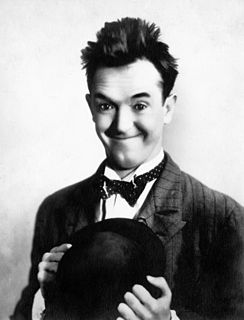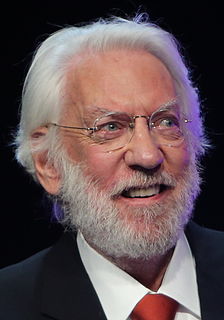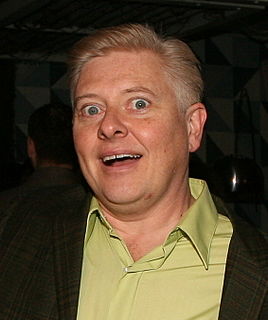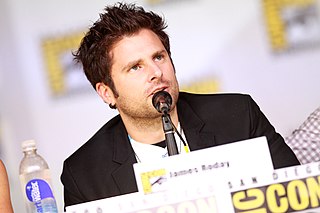A Quote by Stan Laurel
We did have a script, but it didn't consist of the routines and gags. It outlined the basic story idea and just a plan for us to follow. But when it came to each scene, we and the gagmen would work out ideas.
Related Quotes
The ideas always have to be in service of the story. And that's what Scott and the writers did - they weren't trying to beat you over the head with an idea; they had a story they wanted to tell, and they had ideas, so they used the story as a way of fleshing out the ideas. It all depends on where they want to go with it.
I'm running out of time, and a Western is America's answer to a Greek tragedy, so that's what we did. [Kiefer] hired Brad [Mirman] to write the script and he had the ideas, and then he and I did stuff on the script to make it a little cleaner to ourselves. And then, we played it. We were just actors working together, and our DNA must have informed it somehow. Certainly, we came out of it purified a little bit.
Certain movies like 'Wag The Dog,' we used improv on every scene that we did. Pretty much, we would shoot from the script and then some stuff that we came up with in rehearsal, and then we'd have at least one or two takes where we completely went off the script and just flew by the seat of our pants.
The fascinating thing about the studio was that there was no story department. They would put a little notice up on the bulletin board saying: 'The next Oswald will take place at the North Pole. Anybody having any gags, please turn them in before such a date.' If you turned in gags regularly, the way Tex Avery, Cal Howard, Jack Carr and two or three others of us did, you'd be called into the gag meeting. The group would go into Walt's office and talk about whatever the subject of the cartoon was. Walt would put it into some kind of form and that was the story--no scripts, no storyboards.
Edward and I had not had a last grand scene of farewell, nor did I plan one. To speak the word was to make it final. It would be the same as typing the words The End on the last page of a manuscript. So we did not say our goodbyes, and we stayed very close to each other, always touching. Whatever end found us, it would not find us separated.
I wrote the plot [for the Persepolis ]and Vincent [Paronnaud] and I wrote and discussed the shooting of the script. Vincent then took care of the production design, the actual shooting, and what was going on within each scene. It's very difficult, though, to draw a line between who did what. Because Vincent would say something, and I would add something, and at the end you have this film, yet no clear idea of who did what.
I don't particularly like the idea that there's an arc to the story and that therefore in this scene you have to convey this bit of information or emotion. I like more the feeling that, of course, there is a shape to the story, but that each scene should feel right, should be true at that moment, and that gradually you accumulate these moments of truth until you get enough of them together that it becomes a story that's interesting.
And my dad's answer would be usually something to the affect of, A, it came out better than he imagined, but also, he said, "No, it would be impossible for me to imagine the way it will come out." He said, "Yes, I story-boarded it, I had a plan, but then I work with an army of great artists and I want all of them to create inside that creation."
My plan was to go to New York and do some theatre, and then I got the script for 'Psych.' I was like, 'Ahh - just as I thought I was out, you pulled me back in!' I had a great meeting with the show creator and we laid out the parameters to make the show work: what I would do, what he would let me do.




































